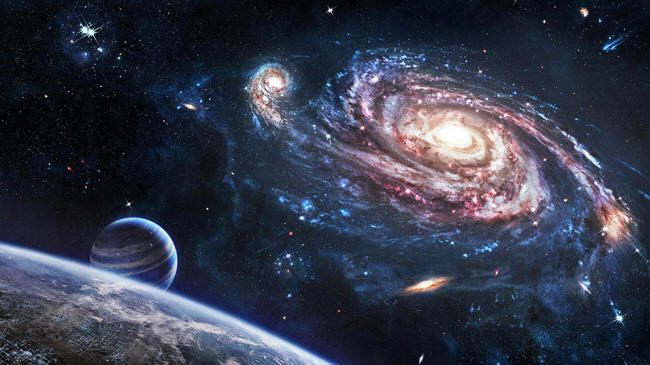|

by Carlo Dorofatti
July 28,
2012
from
MindBreathMeditation Website

According to mythical images, Consciousness (or perhaps that aspect
of Absolute Consciousness that we might include in the concept of
'Cosmic-Human Soul') expresses an act of will and creative love.
It emanates, it is a
vibration with the ability to generate a wave of existence:
to manifest itself
from this Cosmos in which laws and significance are
progressively discovered.
It will assume a shape
and consistency that can be perceived and lived by consciousness,
infused in the dimensions and bodies that will take on material
Form, life, thoughts, entities and gods in the making.
We are all of this. Each one of us is an emanation of the Absolute
Consciousness.
Even though,
paradoxically, we stop being so until we rediscover our primordial
and eternal nature. This arrives through an understanding of renewed
existential formulas or else through discovering the meaning of our
life, the knowledge and experience of which must lead to the
re-evolution of Cosmic Consciousness in time.
In Hindu metaphor this process is expressed as the
Great
Breath of
Brahma which creates and destroys worlds in an incessant cyclical
rhythm.
God breathes out
and the universe proceeds from the appearance of laya, or
neutral centre, or else from the primordial meeting point of forces:
the field of aggregation.
With the intake of breath the universe is
called back to the source and ceases to exist, but on the
act of
breathing out again manifestation begins anew.
Being (Para-Brahman) reveals itself in this field of forces,
presented by Cosmic Consciousness in the form of Human
Consciousness. Thus Being and Consciousness reveal and show
themselves, they fragment and recompose:
DISSOLVE and
COAGULATE.
In the ultimate analysis,
What is the voice of the Self if not the boom of God's breath in our
inner silence?
The memory of the primordial Will?
29. For I am divided
for love's sake, for the chance of union.
30. This is the creation of the world, that the pain of division
is as nothing, and the joy of dissolution all.
Aiwass
Liber AL vel Legis, I
In Islamic tradition it
is said:
"I was a treasure
unknown then I desired to be known so I created a Creation to
which I made myself known, then they knew Me".
The question of being and
the soul has occupied eminent philosophers and thinkers from
Parmenide to Eraclitus, from Socrates to Plato
and Plotinus, resurfacing after centuries of 'darkness' in
the Middle Ages with,
Cusanus, Erasmus of
Rotterdam, Pico de la Mirandola and Bacon of the Renaissance, a
period in which the great christian philosophers such as St.
Augustine and St. Thomas Aquinas nevertheless managed to make
their mark.
And finally with the most
recent illuminists - Hume, Leibniz, Kant, Fichte and Nietzsche - to
arrive at a peak in the magic and
Thelemic-Hermetic renaissance
of the early years of last century.
I personally like to
single them out as a forewarning of scientific, cultural, social and
political ferment.
Today all of this can be translated into the language of Physics.
Think for example of the
concept of the holographic universe (Bohm, Aspect, Pribram) which,
in the 1980's, explained how the known material world is nothing
more than the illusory multi-form projection of a single source.

To illustrate this point, below I include several excerpts from the
famous article
'Does Objective reality Exist, or is the
Universe a Phantasm?' by Michael Talbot.
Bohm believes the
reason subatomic particles are able to remain in contact with
one another regardless of the distance separating them is not
because they are sending some sort of mysterious signal back and
forth but because their separateness is an illusion.
He argues that at
some deeper level of reality such particles are not individual
entities but are actually extensions of the same fundamental
something.
[…]
According to Bohm, the apparent faster-than-light connection
between subatomic particles is really telling us that there is a
deeper level of reality we are not privy to, a more complex
dimension beyond our own. . […].
And, he adds, we view
objects such as subatomic particles as separate from one another
because we are seeing only a portion of their reality. Such
particles are not separate 'parts' but facets of a deeper and
more underlying unity. […]
And since everything
in physical reality is comprised of these 'eidolons', the
universe is itself a projection, a hologram.
In addition to its phantom like nature, such a universe would
possess rather startling features. If the apparent separateness
of subatomic particles is illusory, it means that at a deeper
level of reality all things in the universe are infinitely
interconnected.
The electrons in a
carbon atom in the human brain are connected to the subatomic
particles that comprise every salmon that swims, every heart
that beats and every star that shimmers in the sky.
Everything
interpenetrates everything and although human nature may seek to
categorize and pigeonhole and subdivide, the various phenomena
of the universe, all apportionments are of necessity artificial
and all of nature is ultimately a seamless web.
In a holographic universe even time and space could no longer be
viewed as fundamentals.
Because concepts such as location break
down in a universe in which nothing is truly separate from
anything else, time and three-dimensional space, (like the
images of the fish on the TV monitors) would also have to be
viewed as projections of this deeper order.
At its deeper level
reality is a sort of super hologram in which the past, present
and future exist simultaneously. […]
If a hologram of a rose is cut in half and then illuminated by a
laser, each half will still be found to contain the entire image
of the rose. Indeed even if the halves are divided again, each
snippet of film will be found to contain a smaller but intact
version of the original image.
Unlike normal photographs every
part of a hologram contains all the information possessed by the
whole. The 'whole in every
part' nature of a hologram provides us with an entirely new way
of understanding organization and order.
[…]
Allowing, for the sake of argument, that the super hologram is
the matrix that has given birth to everything in our universe,
at the very least it contains every subatomic particle that has
been or will be - every configuration of matter and energy that
is possible, from snowflakes to quasars, from blue whales to
gamma rays. It must be seen as a sort of cosmic storehouse of
'All That Is'.
[…]
Such findings suggest that it is only in the holographic domain
of consciousness that such frequencies are sorted out and
divided up into conventional perceptions.
But the most mind-boggling aspect of Pribram's holographic model
of the brain is what happens when it is put together with Bohm's
theory.
For if the
concreteness of the world is but a secondary reality and what is
'there' is actually a holographic blur of frequencies and if the
brain is also a hologram and only selects some of the
frequencies of this blur and mathematically transforms them into
sensory perceptions, what becomes of objective reality? Put
quite simply, it ceases to exist.
As the religions of
the East have long upheld, the material world is Maya, an
illusion, and although we may think we are physical beings
moving through a physical world, this too is an illusion.
We are really 'receivers' floating through a kaleidoscopic sea
of frequency and what we extract from this sea and transmogrify
into physical reality is but one channel from many extracted out
of the super hologram
This striking new picture of reality, the synthesis of Bohm and
Pribram's views, has come to be called the-holographic-paradigm
and although many scientists have greeted it with skepticism, it
has galvanized others. A small but growing group of researchers
believe it may be the most accurate model of reality science has
arrived at thus far. […]
In a universe in which individual brains are actually
indivisible portions of the greater hologram and everything is
infinitely interconnected, telepathy may merely be the accessing
of the holographic level.
[…]
The holographic paradigm also has implications for so-called
hard sciences like biology.
Keith Floyd, a
psychologist at
Virginia Intermont College, has pointed out that
if the concreteness of reality is but a holographic illusion, it
would no longer be true to say the brain produces consciousness.
Rather it is consciousness that creates the appearance of the
brain - as well as the body and everything around us we
interpret as physical.
Such a turnabout in the way we view biological structures has
caused researchers to point out that medicine and our under
standing of the healing process could also be transformed by the
holographic paradigm.
If the apparent
physical structure of the body is but a holographic projection
of consciousness, it becomes clear that each of us is much more
responsible for our health than current medical wisdom allows.
What we now view as miraculous remissions of disease may
actually be due to changes in consciousness which in turn effect
changes in the hologram of the body.
Similarly, controversial new healing techniques such as
visualization may work so well because in the holographic domain
of thought, images are ultimately as real as 'reality'. […]
What we perceive as reality is only a canvas waiting for us to
draw upon it any picture we want. […]
Perhaps we agree on what is 'there' or 'not there' because what we
call consensus reality is formulated and ratified at the level of
the human unconscious at which all minds are infinitely
interconnected.
| 


